
Sometimes, you might find yourself in a situation where you need money urgently, but you do not want to take out a loan. Maybe you have a bad credit score, or you are already in debt, or you do not want to pay high interest rates or fees. Maybe you are worried about the risks and consequences of defaulting on a loan, or you simply do not like the idea of owing money to someone else. Whatever the reason, you might be looking for other ways to get the cash you need without taking on more debt.
Fortunately, there are many loan alternatives that you can consider, depending on your circumstances and preferences. Some of these options are more convenient and affordable than others, but they all have their own advantages and disadvantages. In this article, we will explore eight different loan alternatives, and help you decide which one is best for you. We will also give you some tips and resources to help you find and access these options, and avoid potential pitfalls and scams.
Before we dive into the details, let us first clarify what we mean by loan alternatives. A loan alternative is any way of getting money that does not involve borrowing from a traditional lender, such as a bank, a credit union, or a payday loan company. A loan alternative can be either formal or informal, legal or illegal, and may or may not involve interest, fees, or collateral. A loan alternative can also be either short-term or long-term, depending on how quickly you need the money and how long you can repay it.
To help you choose the best loan alternative for you, here are some questions that you can ask yourself:
- How much money do I need, and for what purpose?
- How quickly do I need the money, and for how long?
- How good is my credit score, and how important is it for me?
- How strong is my social network, and how comfortable am I with asking for help?
- How skilled or talented am I, and how willing am I to work for money?
- How flexible or favorable are the terms and conditions of the loan alternative?
- How reliable or trustworthy are the sources or providers of the loan alternative?
- How easy or difficult is the application or repayment process of the loan alternative?
- How risky or safe is the loan alternative, and what are the potential consequences?
By answering these questions, you can narrow down your options, and find the one that suits you best. You can also use some online tools or calculators, such as the Loan Alternative Finder, or the Loan Alternative Comparison Tool, to help you compare and evaluate different loan alternatives, and to find the best one for you.
Option 1: Borrowing from friends or family
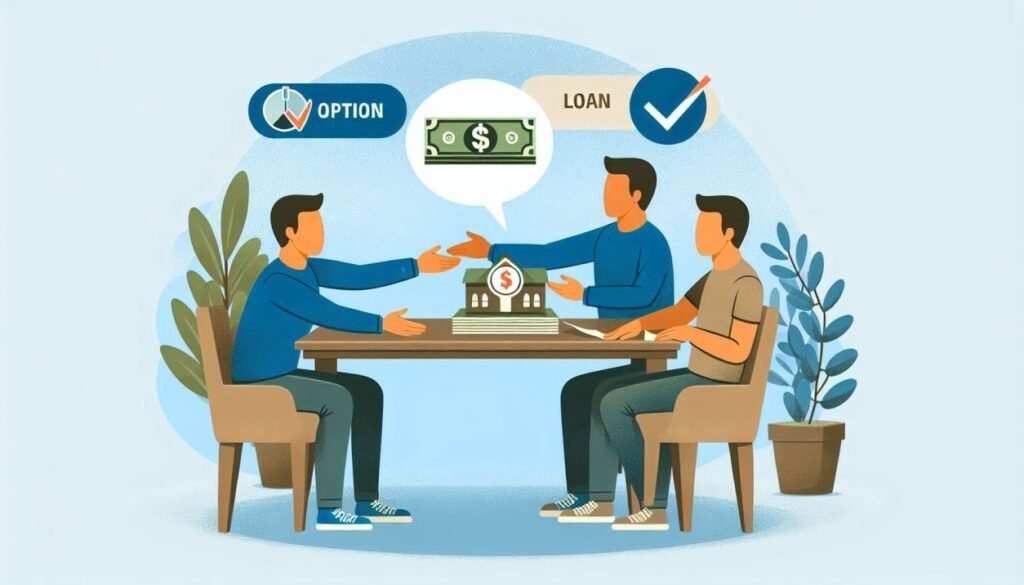
One of the most common and easiest ways to get money without taking out a loan is to borrow from your friends or family. This can be a great option if you have a close and trusting relationship with someone who is willing and able to lend you money, and if you are confident that you can repay them on time and in full. Borrowing from friends or family can also save you money, as you may not have to pay any interest or fees, or you may be able to negotiate a lower rate than what a lender would charge you.
However, borrowing from friends or family also has some drawbacks and risks. First of all, you may not have anyone in your social circle who can lend you money, or who can lend you enough money to meet your needs. Secondly, you may feel embarrassed or ashamed to ask for money, or you may worry about damaging your relationship with the person who lends you money. Thirdly, you may face pressure or resentment from the person who lends you money, or from other friends or family members who may not approve of your decision. Fourthly, you may not have a clear and written agreement on the terms and conditions of the loan, such as the amount, the repayment schedule, the interest rate, and the consequences of default. This can lead to misunderstandings, conflicts, or legal disputes if something goes wrong.
Therefore, if you decide to borrow from friends or family, you should follow some best practices to avoid these problems. Here are some tips to help you borrow from friends or family in a safe and respectful way:
- Only borrow what you need and what you can afford to repay. Do not ask for more money than necessary, or more money than you can realistically pay back within a reasonable time frame. This will reduce the burden on both you and the person who lends you money, and increase the chances of a successful repayment.
- Be honest and transparent about why you need the money and how you will use it. Do not lie or exaggerate about your situation, or use the money for something other than what you agreed on. This will help you build trust and credibility with the person who lends you money, and avoid any suspicion or disappointment.
- Have a clear and written agreement on the terms and conditions of the loan. Make sure you and the person who lends you money agree on the amount, the repayment schedule, the interest rate, and the consequences of default. Write down these details and sign the agreement, and keep a copy for yourself and for the person who lends you money. This will help you avoid any confusion, ambiguity, or disagreement later on, and provide evidence in case of a dispute or a legal action.
- Communicate regularly and respectfully with the person who lends you money. Keep them updated on your progress and situation, and let them know if you encounter any difficulties or delays in repaying the loan. Do not ignore or avoid their calls or messages, or make excuses or false promises. Be polite and grateful, and show appreciation for their generosity and support. This will help you maintain a good relationship with the person who lends you money, and prevent any resentment or frustration.
- Repay the loan as soon as possible and in full. Do not miss any payments or pay less than what you agreed on, unless you have a valid reason and you have informed and obtained consent from the person who lends you money. Do not prolong the repayment period or ask for more money, unless you have a genuine emergency and you have exhausted all other options. Pay back the loan as quickly and completely as you can, and do not take advantage of the person who lends you money. This will help you demonstrate your responsibility and integrity, and avoid any penalties or legal actions.
Option 2: Selling or pawning your belongings
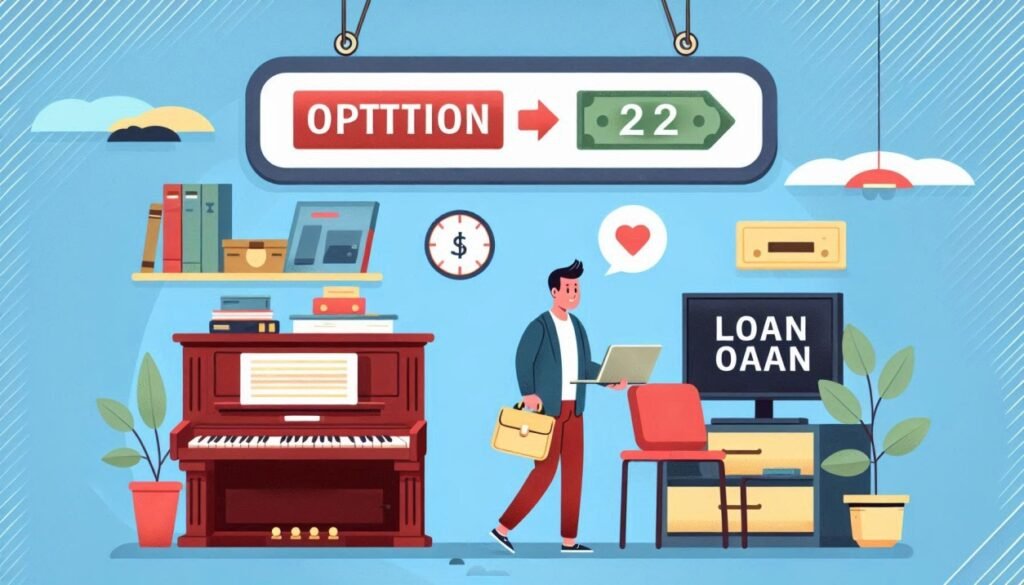
Another way to get money without taking out a loan is to sell or pawn some of your belongings. This can be a good option if you have some items that you do not need or use anymore, or that have some value or demand in the market. Selling or pawning your belongings can help you get cash quickly and easily, without having to go through a credit check or a lengthy application process. Selling or pawning your belongings can also help you declutter your space and simplify your life, as well as reduce your expenses and liabilities.
However, selling or pawning your belongings also has some disadvantages and risks. First of all, you may not have any items that you can sell or pawn, or that can fetch a good price or enough money to meet your needs. Secondly, you may have to part with some items that you still need or want, or that have some sentimental or emotional value to you. Thirdly, you may have to deal with some shady or dishonest buyers or pawnbrokers, who may try to scam you or rip you off. Fourthly, you may lose ownership or access to your items permanently or temporarily, depending on whether you sell or pawn them. This can affect your quality of life or your ability to generate income in the future.
Therefore, if you decide to sell or pawn your belongings, you should follow some best practices to avoid these problems. Here are some tips to help you sell or pawn your belongings in a smart and safe way:
- Only sell or pawn what you can afford to lose. Do not sell or pawn any items that you still need or want, or that have some sentimental or emotional value to you. This will prevent you from regretting your decision or feeling depressed or deprived.
- your car, your phone, your laptop, or your tools. This will prevent you from losing your mobility, your communication, your productivity, or your income potential.
- Do some research and comparison before you sell or pawn your items. Do not sell or pawn your items to the first buyer or pawnbroker that you find, or accept the first offer that you receive. Do some online research and comparison to find out the market value and demand of your items, and to find the best places and platforms to sell or pawn them. You can use websites like eBay, Amazon, Craigslist, or Facebook Marketplace to check the prices and reviews of similar items, and to list your items for sale. You can also use websites like PawnGuru, PawnBat, or PawnOffer to compare the offers and ratings of different pawn shops in your area, and to request a quote for your items. This will help you get the best deal and the most money for your items, and avoid getting scammed or ripped off.
- Negotiate and haggle for a better price or terms. Do not settle for the first price or terms that the buyer or pawnbroker offers you, or take their word for granted. Try to negotiate and haggle for a higher price or lower interest rate, or for a longer or shorter repayment period, depending on whether you sell or pawn your items. You can use your research and comparison as leverage, and show the buyer or pawnbroker that you know the value and demand of your items, and that you have other options. You can also use your persuasion and communication skills, and be polite and confident, but firm and assertive. This will help you get the most value and the best conditions for your items, and avoid getting cheated or exploited.
- Keep a record and receipt of your transaction. Make sure you get a written and signed receipt or contract from the buyer or pawnbroker, that states the details and terms of the transaction, such as the name and contact information of the parties, the description and condition of the items, the price or loan amount, the interest rate and fees, the repayment schedule and deadline, and the consequences of default or late payment. Keep a copy of the receipt or contract for yourself, and store it in a safe and accessible place. This will help you keep track of your transaction, and provide proof and protection in case of a dispute or a legal action.
Option 3: Taking on a side hustle or freelance work

A third way to get money without taking out a loan is to take on a side hustle or freelance work. This can be a great option if you have some skills, talents, or hobbies that you can monetize, or if you have some spare time and energy that you can use to earn extra income. Taking on a side hustle or freelance work can help you get cash fast and flexibly, without having to commit to a long-term or full-time job. Taking on a side hustle or freelance work can also help you improve your skills and experience, expand your network and portfolio, and pursue your passion and interests.
However, taking on a side hustle or freelance work also has some challenges and risks. First of all, you may not have any skills, talents, or hobbies that are in demand or profitable, or that you enjoy doing. Secondly, you may not have enough time or energy to balance your side hustle or freelance work with your main job or other responsibilities. Thirdly, you may have to deal with some competition or saturation in the market, or some instability or uncertainty in the income. Fourthly, you may have to deal with some legal or tax issues, such as registering your business, filing your taxes, or getting insurance or licenses.
Therefore, if you decide to take on a side hustle or freelance work, you should follow some best practices to avoid these problems. Here are some tips to help you take on a side hustle or freelance work in a smart and safe way:
- Only take on a side hustle or freelance work that matches your skills, interests, and goals. Do not take on any side hustle or freelance work that you do not have the skills, knowledge, or equipment to do, or that you do not enjoy or care about. This will prevent you from wasting your time and money, or delivering poor quality or unsatisfactory results. Also, do not take on any side hustle or freelance work that conflicts with your main job or other obligations, or that violates any contracts or policies that you have signed. This will prevent you from losing your main source of income or facing any legal or ethical consequences.
- Do some research and planning before you start your side hustle or freelance work. Do not jump into any side hustle or freelance work without doing some online research and planning. Find out the market demand and potential of your side hustle or freelance work, and identify your target audience and niche. Find out the best places and platforms to promote and sell your side hustle or freelance work, and the best strategies and tools to market and manage it. Find out the legal and tax requirements and implications of your side hustle or freelance work, and the best practices and resources to comply and optimize them. This will help you prepare and position yourself for success, and avoid any surprises or setbacks.
- Set realistic and achievable goals and expectations for your side hustle or freelance work. Do not expect to make a lot of money or fame from your side hustle or freelance work overnight, or to quit your main job or other commitments anytime soon. Set realistic and achievable goals and expectations for your side hustle or freelance work, based on your skills, time, and resources. Start small and scale up gradually, and test and tweak your side hustle or freelance work as you go. Track and measure your progress and performance, and celebrate your achievements and milestones. This will help you stay motivated and focused, and avoid getting frustrated or burned out.
- Deliver quality and value to your clients or customers. Do not compromise on the quality and value of your side hustle or freelance work, or on the satisfaction and loyalty of your clients or customers. Deliver your side hustle or freelance work on time and on budget, and meet or exceed the expectations and specifications of your clients or customers. Communicate clearly and regularly with your clients or customers, and listen to their feedback and suggestions. Provide excellent customer service and support, and resolve any issues or complaints promptly and professionally. This will help you build your reputation and credibility, and attract and retain more clients or customers.
Option 4: Applying for a grant or scholarship

A fourth way to get money without taking out a loan is to apply for a grant or scholarship. This can be a great option if you need money for a specific purpose, such as education, research, business, or charity. Applying for a grant or scholarship can help you get money that you do not have to repay, or that has very low or no interest or fees. Applying for a grant or scholarship can also help you achieve your personal or professional goals, and enhance your skills and qualifications.
However, applying for a grant or scholarship also has some difficulties and risks. First of all, you may not qualify or be eligible for any grant or scholarship, or you may face a lot of competition or requirements. Secondly, you may have to spend a lot of time and effort to find and apply for a grant or scholarship, and to write a compelling proposal or essay. Thirdly, you may have to wait a long time to get a response or a decision, or you may get rejected or receive less money than you expected. Fourthly, you may have to follow some rules or obligations, such as reporting your progress or results, or maintaining a certain grade point average or performance level.
Therefore, if you decide to apply for a grant or scholarship, you should follow some best practices to avoid these problems. Here are some tips to help you apply for a grant or scholarship in a smart and safe way:
- Only apply for a grant or scholarship that matches your purpose, needs, and qualifications. Do not apply for any grant or scholarship that you do not need or want, or that you do not meet the criteria or standards for. This will prevent you from wasting your time and money, or getting rejected or disqualified. Also, do not apply for any grant or scholarship that has some hidden or unfavorable terms or conditions, such as high interest rates or fees, or strict limitations or restrictions. This will prevent you from getting into trouble or losing your money or rights.
- Do some research and planning before you apply for a grant or scholarship. Do not apply for any grant or scholarship without doing some online research and planning. Find out the availability and suitability of different grants and scholarships, and identify the ones that are most relevant and beneficial for you. Find out the application process and deadlines, and the documents and materials that you need to submit. Find out the selection criteria and process, and the expectations and preferences of the grantors or sponsors. This will help you prepare and position yourself for success, and avoid any surprises or setbacks.
- Write a clear and convincing proposal or essay for your grant or scholarship. Do not write a generic or vague proposal or essay for your grant or scholarship, or copy and paste from other sources. Write a clear and convincing proposal or essay that showcases your purpose, needs, and qualifications, and that explains how you will use the money and what impact you will make. Write in a professional and formal tone, but also show some personality and passion. Use facts and figures, but also use stories and examples. Proofread and edit your proposal or essay, and ask someone else to review it. This will help you stand out and impress the grantors or sponsors, and increase your chances of getting the grant or scholarship.
- Follow up and comply with your grant or scholarship. Do not forget or ignore your grant or scholarship after you receive it, or misuse or abuse it. Follow up and comply with your grant or scholarship, and keep in touch with the grantors or sponsors. Thank them for their generosity and support, and update them on your progress and achievements. Use the money wisely and responsibly, and for the intended purpose only. Follow the rules and obligations of your grant or scholarship, and report any changes or problems. This will help you maintain a good relationship with the grantors or sponsors, and avoid any penalties or legal actions.
Option 5: Negotiating with your creditors or debt collectors
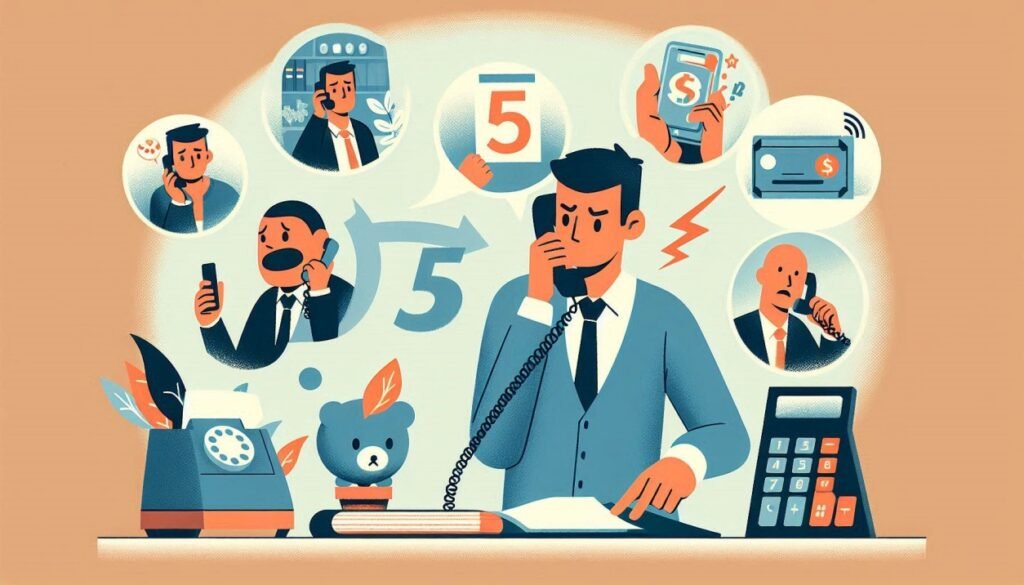
A fifth way to get money without taking out a loan is to negotiate with your creditors or debt collectors. This can be a good option if you already have some debts that you are struggling to pay off, or that are affecting your credit score or financial situation. Negotiating with your creditors or debt collectors can help you reduce the amount or the interest rate of your debt, or extend the repayment period or deadline. Negotiating with your creditors or debt collectors can also help you avoid some negative consequences, such as late fees, penalties, lawsuits, or garnishments.
However, negotiating with your creditors or debt collectors also has some challenges and risks. First of all, you may not have any leverage or bargaining power with your creditors or debt collectors, or they may not be willing or able to negotiate with you. Secondly, you may have to deal with some aggressive or abusive tactics or behaviors from your creditors or debt collectors, such as harassment, threats, or lies. Thirdly, you may have to make some sacrifices or compromises, such as paying a lump sum or a settlement, or agreeing to a payment plan or a hardship program. Fourthly, you may have to deal with some tax or credit implications, such as reporting your forgiven or settled debt as income, or having a negative mark on your credit report.
Therefore, if you decide to negotiate with your creditors or debt collectors, you should follow some best practices to avoid these problems. Here are some tips to help you negotiate with your creditors or debt collectors in a smart and safe way:
- Only negotiate with your creditors or debt collectors if you have a valid reason and a realistic plan. Do not negotiate with your creditors or debt collectors if you do not have a genuine hardship or emergency, or if you do not have a realistic plan to pay off your debt. This will prevent you from wasting your time and money, or making your situation worse. Also, do not negotiate with your creditors or debt collectors if you have some legal or contractual obligations, such as a bankruptcy or a court order. This will prevent you from breaking the law or violating the terms of your agreement.
- Do some research and preparation before you negotiate with your creditors or debt collectors. Do not negotiate with your creditors or debt collectors without doing some online research and preparation. Find out the details and status of your debt, such as the amount, the interest rate, the fees, the due date, and the creditor or debt collector’s name and contact information. Find out your rights and options as a debtor, such as the Fair Debt Collection Practices Act, the statute of limitations, or the debt validation. Find out the best strategies and tactics to negotiate with your creditors or debt collectors, such as the debt snowball or avalanche method, the debt settlement or consolidation method, or the hardship or forbearance program. This will help you prepare and position yourself for success, and avoid any surprises or setbacks.
- Communicate clearly and respectfully with your creditors or debt collectors. Do not ignore or avoid your creditors or debt collectors, or be rude or hostile to them. Communicate clearly and respectfully with your creditors or debt collectors, and let them know your situation and your intention to negotiate. Use written or recorded communication, such as letters, emails, or phone calls, and keep a copy or a record of your communication. Be polite and cooperative, but also firm and assertive. This will help you maintain a good relationship with your creditors or debt collectors, and prevent any harassment or abuse.
- Make a reasonable and realistic offer or request to your creditors or debt collectors. Do not make an unreasonable or unrealistic offer or request to your creditors or debt collectors, or expect them to accept it without any evidence or explanation. Make a reasonable and realistic offer or request to your creditors or debt collectors, based on your income, expenses, and assets, and on the market value and demand of your debt. Provide some proof or documentation to support your offer or request, such as your income statements, bank statements, or hardship letters. Explain how your offer or request will benefit both you and your creditors or debt collectors, such as by saving time and money, or by avoiding legal actions. This will help you persuade and convince your creditors or debt collectors, and increase your chances of getting a favorable outcome.
Option 6: Using a credit card or overdraft
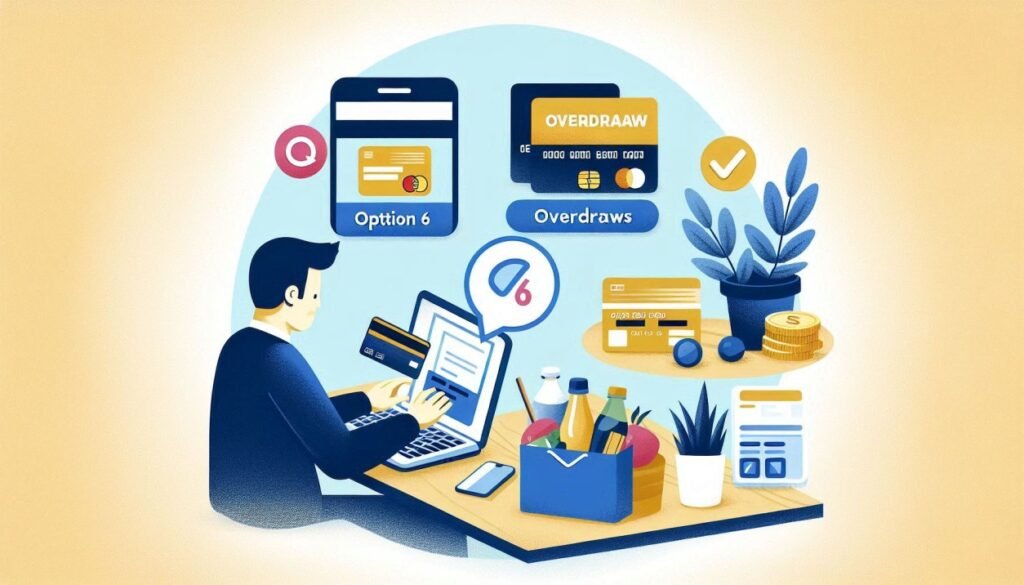
A sixth way to get money without taking out a loan is to use a credit card or overdraft. This can be a good option if you have a credit card or a bank account with an overdraft facility, and if you need money for a short-term or emergency purpose. Using a credit card or overdraft can help you get money instantly and conveniently, without having to apply for a loan or provide any collateral. Using a credit card or overdraft can also help you build or improve your credit score, if you pay back the money on time and in full.
However, using a credit card or overdraft also has some drawbacks and risks. First of all, you may not have a credit card or a bank account with an overdraft facility, or you may have reached your credit limit or overdraft limit. Secondly, you may have to pay high interest rates or fees for using a credit card or overdraft, especially if you miss a payment or go over your limit. Thirdly, you may have to deal with some negative impacts on your credit score or financial situation, such as lower credit rating, higher debt-to-income ratio, or increased risk of default. Fourthly, you may have to deal with some temptation or addiction, such as overspending, impulse buying, or relying on credit or overdraft as a regular source of income.
Therefore, if you decide to use a credit card or overdraft, you should follow some best practices to avoid these problems. Here are some tips to help you use a credit card or overdraft in a smart and safe way:
- Only use a credit card or overdraft for a short-term or emergency purpose. Do not use a credit card or overdraft for a long-term or non-essential purpose, such as buying luxury items, paying for vacations, or funding a lifestyle that you cannot afford. This will prevent you from accumulating more debt than you can handle, or wasting money on interest or fees. Also, do not use a credit card or overdraft to pay off another debt, such as a loan or a bill. This will prevent you from creating a cycle of debt, or transferring your debt from one source to another.
- Choose the best credit card or overdraft for your needs and preferences. Do not use any credit card or overdraft that you have, or that you can get easily. Choose the best credit card or overdraft for your needs and preferences, based on the features and benefits that they offer. Compare the interest rates, fees, limits, rewards, and terms and conditions of different credit cards or overdrafts, and find the ones that suit your budget and goals. You can use websites like NerdWallet, Credit Karma, or Bankrate to compare and review different credit cards or overdrafts, and to apply for them online. This will help you save money and get the most value from your credit card or overdraft, and avoid any surprises or setbacks.
- Use your credit card or overdraft wisely and responsibly. Do not use your credit card or overdraft more than you need or can afford, or more than your limit or balance. Use your credit card or overdraft wisely and responsibly, and only for the intended purpose. Keep track of your spending and transactions, and monitor your credit card or overdraft statements and alerts. Pay back the money as soon as possible and in full, or at least pay the minimum amount or the interest every month. Avoid any late payments, over-limit fees, or penalty charges. This will help you maintain a good credit score and financial situation, and avoid any penalties or legal actions.
- Seek help or advice if you have trouble with your credit card or overdraft. Do not ignore or avoid your credit card or overdraft problems, or hope that they will go away by themselves. Seek help or advice if you have trouble with your credit card or overdraft, such as missing a payment, going over your limit, or falling into debt. Contact your credit card issuer or bank, and explain your situation and your intention to resolve it. Ask for some options or solutions, such as lowering your interest rate, waiving your fees, or adjusting your payment plan. You can also contact a nonprofit credit counseling agency, such as the National Foundation for Credit Counseling, or the Financial Counseling Association of America, and get some free or low-cost advice or assistance. This will help you deal with your credit card or overdraft problems, and avoid any further damage or consequences.
Option 7: Joining a lending circle or peer-to-peer platform

A seventh way to get money without taking out a loan is to join a lending circle or a peer-to-peer platform. This can be a good option if you have a good credit score or a strong social network, and if you need money for a personal or business purpose. Joining a lending circle or a peer-to-peer platform can help you get money from other individuals or groups, who are willing to lend you money at a lower or no interest rate, or with more flexible or favorable terms. Joining a lending circle or a peer-to-peer platform can also help you support or benefit from other people who are in a similar situation as you, and create a sense of community and solidarity.
However, joining a lending circle or a peer-to-peer platform also has some drawbacks and risks. First of all, you may not be able to join a lending circle or a peer-to-peer platform, or you may face a lot of competition or requirements. Secondly, you may have to pay some fees or commissions for joining a lending circle or a peer-to-peer platform, or for using their services or features. Thirdly, you may have to deal with some uncertainty or unreliability, such as not getting the money that you requested or expected, or not getting the money on time or at all. Fourthly, you may have to deal with some legal or tax issues, such as registering your lending circle or peer-to-peer platform, filing your taxes, or getting insurance or licenses.
Therefore, if you decide to join a lending circle or a peer-to-peer platform, you should follow some best practices to avoid these problems. Here are some tips to help you join a lending circle or a peer-to-peer platform in a smart and safe way:
- Only join a lending circle or a peer-to-peer platform that matches your purpose, needs, and qualifications. Do not join any lending circle or peer-to-peer platform that you do not need or want, or that you do not meet the criteria or standards for. This will prevent you from wasting your time and money, or getting rejected or disqualified. Also, do not join any lending circle or peer-to-peer platform that has some hidden or unfavorable terms or conditions, such as high interest rates or fees, or strict limitations or restrictions. This will prevent you from getting into trouble or losing your money or rights.
- Do some research and planning before you join a lending circle or a peer-to-peer platform. Do not join any lending circle or peer-to-peer platform without doing some online research and planning. Find out the availability and suitability of different lending circles or peer-to-peer platforms, and identify the ones that are most relevant and beneficial for you. Find out the application process and deadlines, and the documents and materials that you need to submit. Find out the selection criteria and process, and the expectations and preferences of the lenders or borrowers. This will help you prepare and position yourself for success, and avoid any surprises or setbacks.
- Choose the best lending circle or peer-to-peer platform for your needs and preferences. Do not join any lending circle or peer-to-peer platform that you have, or that you can get easily. Choose the best lending circle or peer-to-peer platform for your needs and preferences, based on the features and benefits that they offer. Compare the interest rates, fees, limits, rewards, and terms and conditions of different lending circles or peer-to-peer platforms, and find the ones that suit your budget and goals. You can use websites like LendingClub, Prosper, or Kiva to compare and review different lending circles or peer-to-peer platforms, and to apply for them online. This will help you save money and get the most value from your lending circle or peer-to-peer platform, and avoid any surprises or setbacks.
- Use your lending circle or peer-to-peer platform wisely and responsibly. Do not use your lending circle or peer-to-peer platform more than you need or can afford, or more than your limit or balance. Use your lending circle or peer-to-peer platform wisely and responsibly, and only for the intended purpose. Keep track of your borrowing and lending activities, and monitor your lending circle or peer-to-peer platform statements and alerts. Pay back the money as soon as possible and in full, or at least pay the minimum amount or the interest every month. Avoid any late payments, over-limit fees, or penalty charges. This will help you maintain a good credit score and financial situation, and avoid any penalties or legal actions.
- Seek help or advice if you have trouble with your lending circle or peer-to-peer platform. Do not ignore or avoid your lending circle or peer-to-peer platform problems, or hope that they will go away by themselves. Seek help or advice if you have trouble with your lending circle or peer-to-peer platform, such as missing a payment, going over your limit, or falling into debt. Contact your lending circle or peer-to-peer platform, and explain your situation and your intention to resolve it. Ask for some options or solutions, such as lowering your interest rate, waiving your fees, or adjusting your payment plan. You can also contact a nonprofit credit counseling agency, such as the National Foundation for Credit Counseling, or the Financial Counseling Association of America, and get some free or low-cost advice or assistance. This will help you deal with your lending circle or peer-to-peer platform problems, and avoid any further damage or consequences.
Option 8: Seeking financial counseling or assistance
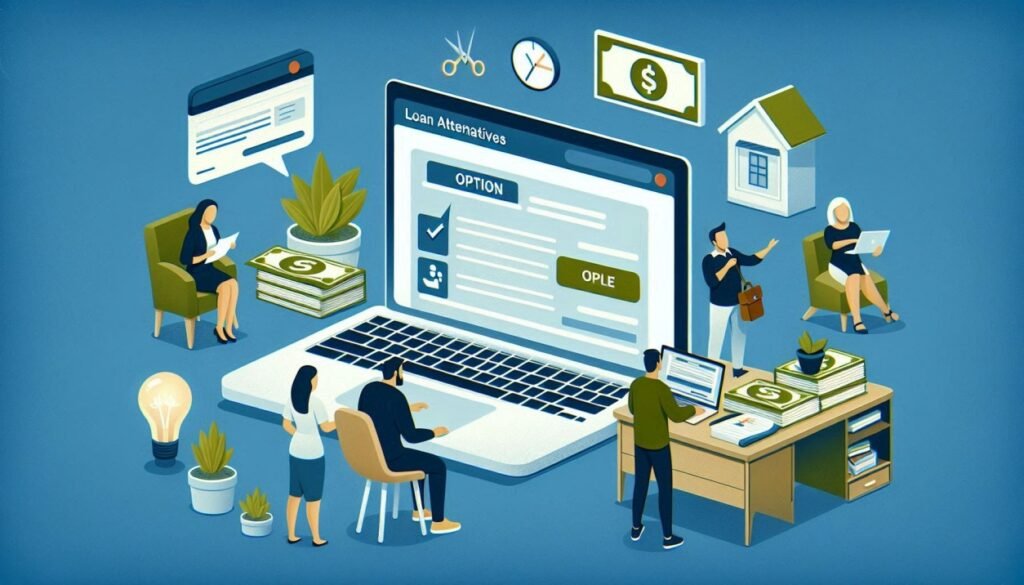
An eighth way to get money without taking out a loan is to seek financial counseling or assistance. This can be a good option if you need money for a long-term or essential purpose, such as paying off your debts, saving for your retirement, or buying a home. Seeking financial counseling or assistance can help you get money from other sources, such as government programs, nonprofit organizations, or community groups, who are willing to provide you with free or low-cost advice or aid. Seeking financial counseling or assistance can also help you improve your financial literacy and skills, and create a realistic and sustainable budget and plan.
However, seeking financial counseling or assistance also has some difficulties and risks. First of all, you may not qualify or be eligible for any financial counseling or assistance, or you may face a lot of competition or requirements. Secondly, you may have to spend a lot of time and effort to find and apply for financial counseling or assistance, and to follow their guidelines or recommendations. Thirdly, you may have to wait a long time to get a response or a decision, or you may get rejected or receive less money than you expected. Fourthly, you may have to deal with some stigma or discrimination, such as being judged or looked down upon by others, or being treated differently or unfairly by the providers or recipients of financial counseling or assistance.
Therefore, if you decide to seek financial counseling or assistance, you should follow some best practices to avoid these problems. Here are some tips to help you seek financial counseling or assistance in a smart and safe way:
- Only seek financial counseling or assistance for a long-term or essential purpose. Do not seek financial counseling or assistance for a short-term or non-essential purpose, such as buying luxury items, paying for vacations, or funding a lifestyle that you cannot afford. This will prevent you from wasting your time and money, or taking away the resources or opportunities from others who need them more. Also, do not seek financial counseling or assistance to pay off another debt, such as a loan or a bill. This will prevent you from creating a cycle of debt, or transferring your debt from one source to another.
- Do some research and planning before you seek financial counseling or assistance. Do not seek financial counseling or assistance without doing some online research and planning. Find out the availability and suitability of different financial counseling or assistance programs, and identify the ones that are most relevant and beneficial for you. Find out the application process and deadlines, and the documents and materials that you need to submit. Find out the selection criteria and process, and the expectations and preferences of the providers or recipients of financial counseling or assistance. This will help you prepare and position yourself for success, and avoid any surprises or setbacks.
- Choose the best financial counseling or assistance program for your needs and preferences. Do not seek any financial counseling or assistance program that you have, or that you can get easily. Choose the best financial counseling or assistance program for your needs and preferences, based on the features and benefits that they offer. Compare the interest rates, fees, limits, rewards, and terms and conditions of different financial counseling or assistance programs, and find the ones that suit your budget and goals. You can use websites like USA.gov, Benefits.gov, or Grants.gov to compare and review different financial counseling or assistance programs, and to apply for them online. This will help you save money and get the most value from your financial counseling or assistance program, and avoid any surprises or setbacks.
- Use your financial counseling or assistance program wisely and responsibly. Do not use your financial counseling or assistance program more than you need or can afford, or more than your limit or balance. Use your financial counseling or assistance program wisely and responsibly, and only for the intended purpose. Keep track of your spending and transactions, and monitor your financial counseling or assistance program statements and alerts. Pay back the money as soon as possible and in full, or at least pay the minimum amount or the interest every month. Avoid any late payments, over-limit fees, or penalty charges. This will help you maintain a good credit score and financial situation, and avoid any penalties or legal actions.
- Seek help or advice if you have trouble with your financial counseling or assistance program. Do not ignore or avoid your financial counseling or assistance program problems, or hope that they will go away by themselves. Seek help or advice if you have trouble with your financial counseling or assistance program, such as missing a payment, going over your limit, or falling into debt. Contact your financial counseling or assistance program, and explain your situation and your intention to resolve it. Ask for some options or solutions, such as lowering your interest rate, waiving your fees, or adjusting your payment plan. You can also contact a nonprofit credit counseling agency, such as the National Foundation for Credit Counseling, or the Financial Counseling Association of America, and get some free or low-cost advice or assistance. This will help you deal with your financial counseling or assistance program problems, and avoid any further damage or consequences.
We hope that this article has helped you understand the different loan alternatives that are available to you, and how to choose the best one for you. Remember, you do not have to take out a loan if you need money, as there are many other ways to get money without taking on more debt. However, you should always be careful and responsible with your money, and seek help or advice if you have any trouble or questions. We wish you all the best with your financial goals and decisions, and we hope that you find the best loan alternative for you. Thank you for reading, and have a great day! 😊




